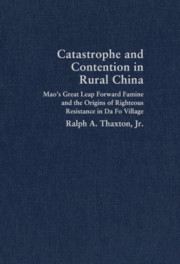 Catastrophe and Contention in Rural China
Catastrophe and Contention in Rural China Book contents
- Frontmatter
- Contents
- Acknowledgments
- Cast of Characters: Da Fo Village (Great Buddha), 1920–1993
- Chronology of Important Events
- Map 1 Provinces of China, neighboring countries, and area of study
- Map 2 Hebei-Shandong-Henan border area, showing location of Da Fo village
- INTRODUCTION
- 1 THE REPUBLICAN ERA AND THE EMERGENCE OF COMMUNIST LEADERSHIP DURING THE ANTI-JAPANESE WAR OF RESISTANCE
- 2 THE ASCENT OF THE VIGILANTE MILITIA: THE VIOLENT ANTECEDENTS OF MAO'S WAR COMMUNISM
- 3 THE ONSET OF COLLECTIVIZATION AND POPULAR DISSATISFACTION WITH MAO'S “YELLOW BOMB” ROAD
- 4 THE MANDATE ABANDONED: THE DISASTER OF THE GREAT LEAP FORWARD
- 5 STRATEGIES OF SURVIVAL AND THEIR ELIMINATION IN THE GREAT LEAP FORWARD
- 6 THE ESCAPE FROM FAMINE AND DEATH
- 7 INDIGNATION AND FRUSTRATED RETALIATION: THE POLITICS OF DISENGAGEMENT
- 8 THE MARKET COMES FIRST: THE ECONOMICS OF DISENGAGEMENT AND THE ORIGINS OF REFORM
- 9 PERSISTENT MEMORIES AND LONG-DELAYED RETALIATION IN THE REFORM ERA
- CONCLUSION
- Bibliography
- Index
- Plate section
CONCLUSION
Published online by Cambridge University Press: 14 May 2010
- Frontmatter
- Contents
- Acknowledgments
- Cast of Characters: Da Fo Village (Great Buddha), 1920–1993
- Chronology of Important Events
- Map 1 Provinces of China, neighboring countries, and area of study
- Map 2 Hebei-Shandong-Henan border area, showing location of Da Fo village
- INTRODUCTION
- 1 THE REPUBLICAN ERA AND THE EMERGENCE OF COMMUNIST LEADERSHIP DURING THE ANTI-JAPANESE WAR OF RESISTANCE
- 2 THE ASCENT OF THE VIGILANTE MILITIA: THE VIOLENT ANTECEDENTS OF MAO'S WAR COMMUNISM
- 3 THE ONSET OF COLLECTIVIZATION AND POPULAR DISSATISFACTION WITH MAO'S “YELLOW BOMB” ROAD
- 4 THE MANDATE ABANDONED: THE DISASTER OF THE GREAT LEAP FORWARD
- 5 STRATEGIES OF SURVIVAL AND THEIR ELIMINATION IN THE GREAT LEAP FORWARD
- 6 THE ESCAPE FROM FAMINE AND DEATH
- 7 INDIGNATION AND FRUSTRATED RETALIATION: THE POLITICS OF DISENGAGEMENT
- 8 THE MARKET COMES FIRST: THE ECONOMICS OF DISENGAGEMENT AND THE ORIGINS OF REFORM
- 9 PERSISTENT MEMORIES AND LONG-DELAYED RETALIATION IN THE REFORM ERA
- CONCLUSION
- Bibliography
- Index
- Plate section
Summary
So what does this case study of Da Fo village allow us to conclude about rural China, and on what matters is it merely suggestive? To be sure, we cannot generalize from such a microlevel case study to all of macrolevel China. Nonetheless, it is possible to offer some tentative reflections about the extent to which Da Fo's history does or does not resonate with the lessons we have learned from leading China scholars about how other parts of rural China were ruled in the Great Leap period, what caused the Great Leap famine, how memories of the Great Leap–era wreckage affected state legitimacy in the immediate and long-term aftermath of the famine, and whether the memories of this episode of Mao-era rule influenced the upsurge of resistance against the perpetrators of the famine in the post-Mao period.
As many top-rank China scholars have concluded, the Great Leap Forward was the product of Mao's determination to rapidly transform China's economy and society and build up a strong socialist state by relying on a disciplined Leninist party. The result was a leftist political frenzy that enveloped villagers in a great famine. Da Fo's political history clearly reveals that entrenched local party cadres willingly aided Mao in his war against the civil and social rights of rural dwellers. Still, it also reaffirms that Mao was the major causal agent of the Great Leap calamity – not the local party cadres who were blamed and scapegoated by Mao and allies at the center of the party.
- Type
- Chapter
- Information
- Catastrophe and Contention in Rural ChinaMao's Great Leap Forward Famine and the Origins of Righteous Resistance in Da Fo Village, pp. 325 - 348Publisher: Cambridge University PressPrint publication year: 2008


